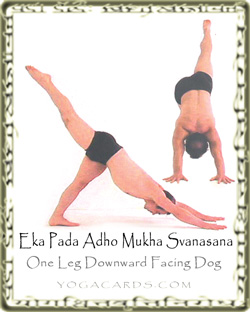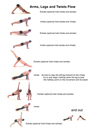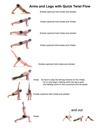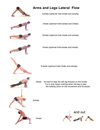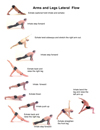
Eka Pada Adho Mukha Svanasana
Translation: One Leg Downward Facing Dog
![]()
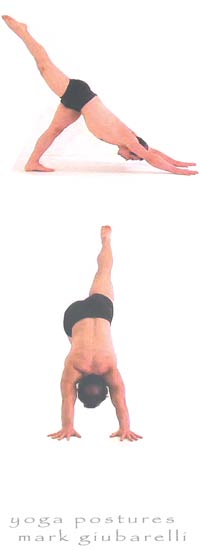
This yoga posture can be entered easily from Downward Dog Pose. The hands are placed down and the first finger or the middle finger points forward.
![]()
The arms are stretched away from the body. They can be extended in line with the spine or sometimes a slight angle is made between the arms and the body for a deeper shoulder stretch.
![]()
The top of the head can be pointing down towards the mat or in line with the direction of force through the arms. One way stretches the neck the other way strengthens it.
![]()
![]()
The navel is raised upwards towards the chest and the tailbone is raised upwards. This will straighten the lower back.
![]()
Then one leg is raised up and back. Try to keep the hips in line.
You can also open the hips and raise the leg higher. Most of the weight and force will move to one arm. It is easier to balance the weight over both arms if the hips are aligned but the hamstring muscles and calf muscles must be flexible.![]()
Benefits
This pose increases the strength and flexibility of the shoulders. The hamstrings, calf muscles (gastrocnemius and the soleus) and the achilles tendon are stretched.
![]()
The hamstring muscles in the raised leg (the biceps femoris, semitendinosus and the semimembranosus) Gluteus Muscles and some lower back muscles are toned.
![]()
Practice yoga at home with a printable Home yoga flow showing this pose blended with other yoga poses.
![]()
See free yoga sequences with this pose. Yoga video included!
Vinyasa Yoga Sequencing and Flowing
Vinyasa Yoga postures to transition from and to:
![]()
![]()
Yoga Teacher Tips
The simple statement which indicates raising one leg up off the mat in Downward Dog pose will be most responsive in class. Mention which leg with the instruction.
Then go into detail about how you want the leg and the hips and other major points of alignment.
![]()
Always mention the breath that accompanies the movement into the pose. It may be more beneficial to mention this before the action is instructed.
![]()
Monitor the response of the class and get feedback from practitioners. This will ensure the instructions, and the order that things are mentioned, are most effective.
![]()
Talking simply about energy or force can help practitioner understand the simple aspect of a complex subject. Talk about lines and try to encourage there expansion.
![]()
“When lines of force feel straight they usually are. In this pose there is a straight line through the arms all the way up to the toes of the raised leg.”
![]()




















